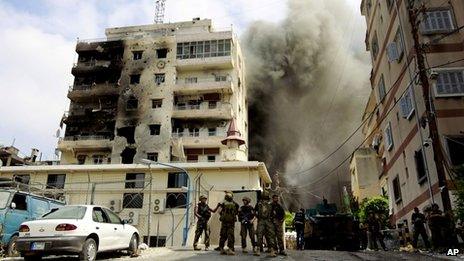Syria war exerts growing strain on Lebanon tinderbox
- Published
Men like Sunni preacher Ahmad al-Assir and his rival Shia counterparts hold the key to what happens next in Lebanon.
In the northern Lebanese port city of Tripoli, armoured personnel carriers from the national army thunder through the chaotic traffic that chokes the city centre.
In the jittery days that have followed the violent clashes between Lebanon's army and fighters loyal to the radical Sunni preacher Sheikh Ahmad al-Assir, the army has two urgent tasks.
The first is to find Mr Assir, who managed to melt away as soldiers stormed the apartment block he had turned into a fortress in the heart of a residential district in the southern city of Sidon.
The second - and more important - task is to reassure an increasingly anxious Lebanese public that it has the capacity to restore calm and maintain order.
It is no surprise that Mr Assir has been the catalyst that has set off the chain of military and political reactions which has left the Lebanese army facing perhaps its most testing week since neighbouring Syria erupted into civil war.
Clouds of war
You can trace the sheikh's rapid evolution from fiery, if rather eccentric, radical Sunni preacher to militia leader in fragments of video widely shown on TV here.
In older footage, there are amusing stunts in which the smiling sheikh takes busloads of his followers onto a ski slope. The cultural message was heavy-handed but harmless, even charming: Islamists like to play in the snow with their children just like everyone else.
But more recent pictures show a much darker figure emerging as the darker clouds that hang over Syria threaten to blow across the border.
We see him long-bearded in a black boiler suit with a Kalashnikov slung across his chest.
It was the civil war in Syria that transformed the sheikh, according to his friends and supporters, just as it threatens to transform everything else here.
As a Sunni radical he has always been a fierce critic of the Shia militant movement Hezbollah. But as Hezbollah began sending fighters in larger and larger numbers to Syria to fight for the government side, Mr Assir decided that fiery denunciation was no longer enough.
He began encouraging his own Sunni followers to travel to Syria to fight for the rebels.
'Stoking the fires'
With Mr Assir on the run, I went to the port of Tripoli to talk to another influential Sunni cleric who has issued a similar call to arms.
Sheikh Salem Rafii has also told the young Sunni men of Lebanon to go and fight in Syria - but says men like him and Mr Assir are merely responding to Hezbollah's decision to go and fight there first.
"There's no doubt that Hezbollah has been interfering in Syria," he told me.

The army faced strong resistance from Sheikh Assir's followers during clashes in Sidon
"That's a factor that can ignite a crisis in Lebanon. If war happens here it will be because of Hezbollah.
"They're stoking the fires in Syria and naturally that will be felt here," Mr Rafii says.
It seems impossible that large numbers of young men can continue crossing from Lebanon into Syria to fight on either side of that bitter and protracted civil war without eventually bringing the violence back across the border.
That is why this week's clashes in Sidon matter - because they provide a dangerous template that could easily be repeated elsewhere in Lebanon on a larger scale.
It started with clashes between rival Shia and Sunni groups, which Lebanese soldiers moved in to quell.
The more serious violence erupted after one of Mr Assir's men was caught at a military checkpoint with unauthorised weapons in his car.
The precise sequence of events that followed the discovery is a subject of fierce dispute, but the bottom line is not: there was heavy fighting between the army and Mr Assir's followers, which left 17 soldiers dead.
When the army finally overran Mr Assir's compound it found heavy weapons and military-style uniforms.
And it was not just the scale of the violence that worried ordinary Lebanese - it was the way in which its roots could be seen so clearly in Syria and in how quickly it had sucked in the forces of the state here.
Lebanon is home to a patchwork of ethnic and religious communities very much like Syria's, and they have been held - almost miraculously - in a kind of delicate equilibrium since the country's own civil war ended more than 20 years ago.
Events in Syria are putting that delicate equilibrium under strain; the longer the war there continues the greater that strain will become.
No-one knows where Mr Assir has gone - he is in hiding and may even be in Syria - but men like him and his counterparts in the rival Shia community hold the key to what happens next in Lebanon and how deeply this country will be affected by Syria's war.
After the events of the last week here it is harder than ever to be optimistic.